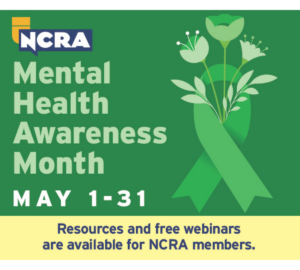The following is the speech given by 2016-2017 NCRA President Nativa P. Wood, RDR, CMRS, at the 2016 Convention & Expo in Chicago, Ill.
When you look at me, which type of athlete do you think I was in high school – a basketball player or a figure skater?
I ask because on many occasions, the Dauphin County Court Administrator would introduce me as “Oksana Baiul,” the slight, graceful Ukrainian figure skater who won the gold medal at the 1994 Olympics.
I know what you’re thinking, “How could anyone confuse Tiva with an Olympic figure skater?”
It’s because this court administrator was amazed –mesmerized – at what I did every day. What I did as a court reporter, she said, was the equivalent of landing a triple axel, triple toe loop combination — and I made it look easy. You and I know differently. We know that it can be ridiculously hard.
As I accept the responsibility to serve as NCRA’s president, I want to be clear: What we have ahead of us as an organization and profession is exactly that — ridiculously hard.
Think about how hard we worked to get through school. Think about the passion and the energy that is present among us. And think about what we can accomplish together if we can harness that passion and that energy and then put it to practical use.
This isn’t figure skating. It’s not an individual sport. We need to be a team and no one can sit on the bench. Each of us has a role to play.
Earlier this year at NCRA’s Firm Owners Executive Conference, I was inspired by a speaker who talked about the power of storytelling.
People love stories. More than facts and figures, a great story can deliver a powerful message; it can inspire ordinary people to do extraordinary things.
Each of us knows what it is like to face something ridiculously hard, meet that challenge, and come out on top. It’s part of our stories.
There are three areas, three priorities, where we must excel, where our story can lead us to success. The first priority is getting more students enrolled in court reporting programs. The second is getting a higher percentage of court reporters to be NCRA members. The third is for all of us to improve our Business IQ.
Court reporters have played a vital role across history as guardians of the record.
- Our story includes the court reporters in Nuremberg, Germany, who did the crucial work of keeping a verbatim record of Nazi war tribunals.
- Our story includes the court reporters doing similar work during the Rwandan trials in Arusha, Tanzania.
- Our story includes the reporters who provided realtime captioning on 9/11.
- And our story incudes court reporters who today are taking down every word at terrorist proceedings in Guantanamo Bay, Cuba.
There is honor in what we do every day. We play a key role in ensuring that every person has access to justice, access to basic services. It’s not all glamorous. We have front-row seats for some of the most gruesome, most heartbreaking parts of life – murder trials, rape trials, child-custody battles, and every manner of civil proceeding. At the same time, many of us take part in depositions that have real impact on not just our legal system, but on the global economy. Captioning? We are in the center of the action.
Every day someone finds new applications for our skills, such as helping presidents and presidential candidates practice speeches and debate skills, companies providing instant-access to transcripts of press conferences, helping some of the world’s most interesting people capture their memoirs, sharing their stories.
None of this happened easily. At times, it has been ridiculously hard.
It has taken resolve, limitless patience, heroic fortitude, endless endurance, a sharp brain and – yes – those very nimble fingers.
And we do it in a seemingly effortless way with no grandstanding, no spotlight. We just do the job.
We have much to be proud of from our past. But if we don’t invest some real energy – some substantial effort – in our future, there won’t be enough reporters for our profession to continue playing such a substantial role in our society.
So, priority one – and this is critical – is student recruitment. Two years ago, NCRA commissioned a study, the Ducker report, which illustrates our challenge in stark terms. Just three years from now, there will be a gap of 5,500 between the population of stenographic court reporters and the demand.
Without a steady supply of new reporters, every facet of our profession will be negatively affected. The door will be opened for alternative means of capturing the spoken word to prevail.
After the Ducker report was released, NCRA launched an aggressive awareness campaign for the profession, known as the CRTakeNote program. It was effective in raising awareness, but it was only a beginning. We must cast even more attention on our profession and then convert those prospects into students.
NCRA has developed a toolkit to help schools do just that.
But converting prospects to students can’t just be the schools’ responsibility. If you and I truly care about our profession, it is our duty to play a role.
Here’s what we know: a working reporter reaching out to prospective students, and telling our story – that scenario makes the biggest and best impression on prospective students. Using our individual stories as a marketing tool to high school students, middle school students, school counselor associations – any group from which we can get an invitation – that is what we need from all of you.
It’s our story, and it resonates. Talk about the remarkable places this profession has taken you – which we’ll celebrate Saturday night. Talk first-hand about how this is a technology-driven profession, how it has provided financial stability for your family.
Schools are eager to have your involvement, to access and leverage your story.
What’s my story about getting involved with court reporting? Well, it involves a water tower, several cans of spray paint, two very unhappy parents who paid for my prank, for which I had to reimburse to them, and the attorney who lived across the street.
Well, maybe we won’t use that story! But your story —your story will work. Your story will encourage someone like you to enroll in school.
We don’t have to do this. The easier route would be to say that time has passed our profession by. We could ride out our time in court reporting together and take no responsibility for the profession’s future.
But I don’t want to do that. Neither do you.
It won’t be enough to get energized here in Chicago. It won’t be enough to write a check and feel like you’ve made your contribution (although NCRF is always happy to take your check as a charitable donation).
This is going to be ridiculously hard. But, as an organization and as a profession, we must rise to the challenge.
It will take an urgent and sustained effort to repopulate our schools and replenish our ranks. It will take a full community effort.
For that community to be at full force to take on such a formidable challenge, we need more NCRA members. That is priority number two.
In the digital age, membership growth is a challenge for many organizations. But there is no question that the problem is more acute for NCRA than for other organizations. Our challenges require that we access the voices — the passion and the energy — of every court reporter.
You and I are in a unique position to lend a hand. Our stories about how NCRA has connected with us personally, how it has enhanced our careers in many different ways, those first-hand stories from fellow reporters can connect in a profound way to supplement NCRA’s efforts.
Some think one-dimensionally about NCRA. It’s just a magazine. But they are wrong. It’s so much more:
- It delivers information you can’t get anywhere else,
- It’s a community, yielding career and business opportunity,
- It’s an advocacy body, protecting our profession,
- And it’s a connection to best practices.
Your engagement shows that you care about your profession.
Why did I join NCRA? A seasoned reporter asked me to get involved in my state association, which then led to my involvement with NCRA. That’s all he had to do: He asked me.
He then mentored me for 30 years until his death last year. He showed me his love for the profession and how being connected could make a difference, but it also was my responsibility. His professional colleagues were his family, and so they became for me. His dedication was infectious; igniting a spark in me to get involved.
Now, I encourage you to share your stories about NCRA to convince others to join.
The third priority I’d like to talk about is Business IQ.
My siblings work in careers that involve sales either primarily or secondarily. They value their reputations, how their colleagues perceive them. They’re always looking to get better, to keep pace with the competition.
I used to thank God I’m not in sales. But I am in sales – and so are you. I’ve been in sales my whole career:
- Convincing judges and commissioners that a stenographic record was best.
- Encouraging colleagues to embrace technology.
- And, now, as I have migrated to the freelance side of the business, using sales to acquire clients.
Whether you’re a firm owner, a contract reporter, official, or captioner, you can up your game with regard to your Business IQ. Come out from behind the machine and be better sales people. We should be out there every day promoting our skills, our repertoire of services, our profession. We should be looking at business metrics, aspiring to meet standards of best practices; exploring new types of services; making investments in technology; and finding new applications for our skills. We should care about how our profession is perceived among those we serve. Each time we go above and beyond to please a client, each time we find innovative solutions, we take one step forward in protecting and enhancing our profession as a whole, telling our story.
We have a great story to tell. Use that story to enhance your career. Use that story to help NCRA recruit a new member. Use that story to help our schools recruit more students, strengthening our profession at its greatest time of need.
Let me finish with one last story. Our son, Patrick, just graduated from high school in May. As a family, we were personally invested in Patrick’s experience in school. Patrick might say perhaps a little too much.
As it is with a lot of things in life, the day-to-day grind sometimes obscured the progress Patrick was making.
It wasn’t always easy; sometimes it was ridiculously hard. There were times when it felt like together we took two steps forward and one step back.
But he got there. And I don’t know that I have ever been prouder than watching Patrick receive his diploma. So, there I am, sitting at his graduation and the motto of the school keeps running through my head: Ad summum bonum. “For the greater good.” I couldn’t help but think about how that is such an appropriate motto for NCRA and for our profession.
Each of us needs to find new ways to harness our energy and passion, to utilize the immense pride that we have for our profession. We need to take active steps to protect, preserve, and advance our profession – not just for ourselves, but for those following in our footsteps. We need to summon our energy and passion to do those things that are ridiculously hard – and do so for the greater good.





